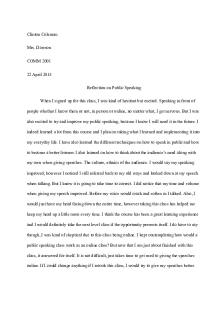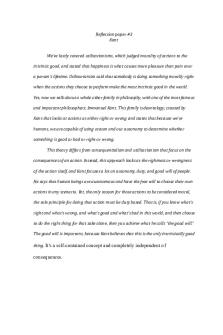A loss for words reflection paper PDF

| Title | A loss for words reflection paper |
|---|---|
| Author | Ella MacCallum |
| Course | Deaf Culture And Heritage |
| Institution | SUNY New Paltz |
| Pages | 6 |
| File Size | 57.4 KB |
| File Type | |
| Total Downloads | 42 |
| Total Views | 166 |
Summary
Download A loss for words reflection paper PDF
Description
My family and I were always very close growing up. We always did everything together, like going to the movies, going out to eat, or just hanging out at home. Communication was very important within the family, and we were never afraid to tell each other if something was wrong or if something was great. That’s what made us so close. Lou Ann Walker and her family were also very close, but something stood in the way of that communication factor: Lou Ann’s parents were deaf. Growing up a CODA, Lou Ann faced many challenges that children of hearing parents would never think of having to face, and in her novel, “A Loss for Words” she discusses those challenges and how it impacted her character and the way that she carried herself and lived her life. Doris Ann, Lou Ann’s mother, lost her hearing due to a relapse of spinal meningitis at thirteen months old. Her parents, known as “Grandma and Grandpa Wells” throughout the book, had “never even met a deaf person before their daughter was stricken.” (Walker, 24). Naturally, therefore, they had no idea how to communicate with, take care of, or even love their daughter in the way that they would have if Doris Jean was hearing. From the moment that they found out that she was Deaf, Grandma and Grandpa Wells, Grandma Wells especially, made it their duty to teach her how to talk, like “the way that Helen Keller had learned” (Walker, 26). They thought that if Doris Ann knew how to communicate orally, it would make their lives and her upbringing a lot easier, due to the fact that they didn’t know how to sign. Eventually, the Wells’s decided to send their daughter to the Indiana State School for the Deaf. Being that they didn’t know how to communicate with her, Doris Jean had no idea why her parents were dropping her off in a remote building and leaving her, so naturally she was traumatized. Additionally, the drive for her parents
was too far “to go and see [Doris Jean] more than a couple of weekends a semester.” (Walker, 27), so the relationship between her and her family was very strained. Doris Ann learned to lean on her friends as family members and, as she got older, used that support to get through school. After graduating, fourteen years after starting school, Doris Jean chose not to move back with her parents, due to the fact that there were no benefits and necessities provided for a Deaf woman such as herself back in her hometown. Instead, she chose to move into an apartment in Indianapolis with her friend, Alice. It was there, and through Alice, that Doris Jean met Lou Ann’s father, known as Puff. Puff lost his hearing due to a sickness, after being brought out in extremely cold weather by his mother, known as Grandma Nellie. Unlike Doris Jean, Puff’s parents, Nellie and H.T, already had a Deaf son: Puff’s older brother, Garnel. However, as the book describes, “Although by that time the family had had nearly twenty years to adjust to deafness, in some ways [Puff’s] must have been the harder to accept.” (Walker, 36) because of behavioral issues on Garnel’s part that Nellie and H.T were afraid of having to go through again. He grew up with a supportive and loving family who only wanted the best for him and his upbringing. The issue with Puff’s family, however, was that H.T had a personal grudge against the superintendent of the Deaf school nearby, so Puff was put in regular public school. There, it was hard for him to learn because “The teacher faced the blackboard so often when she talked that he couldn’t lip-read her.” and “Because his last name started with a W, he was in the last seat in the last row, so he could hardly see her anyway.” (Walker, 38) Eventually, however, the superintendent of the Indiana School for the Deaf changed, and Puff was finally able to go to a school where it was easy for him to learn and progress, even due to the fact that he had to “begin all over..” (Walker, 39) after
being stuck in a school aimed for hearing children. Puff was given much more individual attention at his new school, and “flourished” and blossomed into a well-educated young man as the years went on. When Doris Jean and Puff met, Doris Jean described it as “love at first sight” (Walker, 43). They dated for about a year, and in May of 1951, Puff asked Doris Jean to marry him. This part of the book was one that really stood out to me and made me happy. Doris Jean described the moment as very intimate. “The crowds were all around them..Yet it was an intimate conversation because no one around them could understand what they were saying to each other.” (Walker, 44). Members of Deaf culture have their own language, ASL, in which they communicate using only signs and gestures with their hands. Being that they were surrounded by hearing people in that park where Puff proposed, that moment was theirs and only theirs because they were using their own language to express their love and desire to have each other for the rest of their lives. That kind of connection extended into the duration of their marriage. Though after they ended up having kids, their kids knew the language as well, to be members of that culture and to have that language be theirs and theirs alone made their marriage a meaningful and deep one, and kept them connected to each other no matter the turmoils that they faced. It made me wonder whether in hearing culture, that lack of special meaning and connection throws marriages off in ways that Deaf marriages don’t. My parents, for example, were not happy together because there was never something that kept them together in the way that ASL kept Doris Jean and Puff together. To me, that’s absolutely amazing. Lou Ann was born in 1952, and her parents could not have been happier with her, and could not have been happier with the fact that she was a hearing baby. She says in the book that
“I’m told my mother just radiated happiness my entire infancy..” They put everything they had into making sure that Lou Ann started her life as normally as she possibly could have, even though being a CODA made that harder than it would have been for a hearing child. However, the older Lou Ann got, the more her role in the family was a “head of the family” figure. Being that she could hear and her parents couldn’t, she was the one who always had to interpret, always had to communicate for her parents, and always had to be the one that people went to when there was an issue, question, or statement that needed to be made to her parents. According to Lou Ann, “As soon as I began to sign and talk, I became my parents’ guide.” Due to this, Lou Ann’s character became timid and “not tough enough”. She says in the book that “I’d absorbed my parents’ habit of turning the other cheek.” (Walker, 59) This struck me a little bit. As a child who is not a CODA, I remember learning at a very young age to develop my own character traits and to be able to provide for myself more than anyone else. However, as a CODA, it is obvious that from a young age, Lou Ann was taught by society that having deaf parents means that you have to absorb their character and make sure that you can provide for them. While this is not necessarily bad, and while I applaud Lou Ann for her journey as a hearing child in helping her parents function in a society that turns their back on Deaf people and what their needs are, I do find it interesting how much Lou Ann had to dedicate her life to helping her parents with even the littlest of needs, and how that assisted in her character development. Lou Ann’s first couple of years in college were what I had expected. She decided to stay close to home and to study what felt comfortable to her: Deaf Ed. She entered the Deaf Ed program at Ball State University in Indiana with confidence that she would be able to fall right into the oralist methods that the class was teaching, though she was raised in a family that was
strictly Manualist. However, though she said that “The program’s teachings made good logistical sense.” and that “It seemed true that in order for deaf people to become successful they needed better verbal skills.” (Walker, 138), there was one thing that bothered Lou Ann: the treatment of a deaf student, Marion. The professors saw no resource in Marion, even though she had years of experience in the field and could have been a huge help to the program. They ignored her knowledge and chose to trust their own judgement rather than a deaf person’s to teach the course. According to Lou Ann, “Theories and Goals of education don’t matter a whit if you don’t consider your students to be human beings.” (Walker, 138). Due to this lack of interest in what Ball State had to offer, Lou Ann made the incredible decision to transfer out east to Harvard and to switch up her major to something in the journalism and writing field, leaving her parents and all she knew in the midwest behind. Though she knew that her parents loved her dearly, being farther away from home meant being farther away from her family, which meant that she was choosing to live her own life and develop her own sense of character more than she had when she was home. However, though she chose to live her own life, she still stayed connected to her family back home, and of course asked what they thought before making the decision to move to New York and get a job in the newspaper industry, a far leap from what she had thought she was going to major in when she was in Indiana. All in All, though Lou Ann’s life in college and the decision to move to New York still included her family, that time period in her life was one of new developments and change in her character. Lou Ann lived a life of challenges and learning experiences growing up as a CODA. She never really had time for herself as a child and made sure that her first priority was always her parents. As a child, she saw her parents with a sense of helplessness and weakness, no matter
how much she loved them, because of their inability to hear. Since everyone saw her as the hearing child who was capable of doing everything, that’s how she saw herself and that reflected on her family. However, as she got older and started developing into her own self more, she saw her parents with more of an admiration. After years of keeping her family at bay while she was trying to figure out who she was, as a grown up, she was able to see her parents as strong and capable deaf human beings. I admire them, and I admire her....
Similar Free PDFs

Loss For Words Paper - Grade: A
- 4 Pages

Reflection paper for pino
- 2 Pages

Self Reflection Paper - Grade: A
- 7 Pages

MKT Reflection Paper - Grade: A
- 1 Pages

Reflection Paper #3 - Grade: A
- 8 Pages

Reflection Paper
- 2 Pages

Reflection Paper
- 4 Pages

Reflection Paper
- 2 Pages

Reflection paper
- 3 Pages
Popular Institutions
- Tinajero National High School - Annex
- Politeknik Caltex Riau
- Yokohama City University
- SGT University
- University of Al-Qadisiyah
- Divine Word College of Vigan
- Techniek College Rotterdam
- Universidade de Santiago
- Universiti Teknologi MARA Cawangan Johor Kampus Pasir Gudang
- Poltekkes Kemenkes Yogyakarta
- Baguio City National High School
- Colegio san marcos
- preparatoria uno
- Centro de Bachillerato Tecnológico Industrial y de Servicios No. 107
- Dalian Maritime University
- Quang Trung Secondary School
- Colegio Tecnológico en Informática
- Corporación Regional de Educación Superior
- Grupo CEDVA
- Dar Al Uloom University
- Centro de Estudios Preuniversitarios de la Universidad Nacional de Ingeniería
- 上智大学
- Aakash International School, Nuna Majara
- San Felipe Neri Catholic School
- Kang Chiao International School - New Taipei City
- Misamis Occidental National High School
- Institución Educativa Escuela Normal Juan Ladrilleros
- Kolehiyo ng Pantukan
- Batanes State College
- Instituto Continental
- Sekolah Menengah Kejuruan Kesehatan Kaltara (Tarakan)
- Colegio de La Inmaculada Concepcion - Cebu






